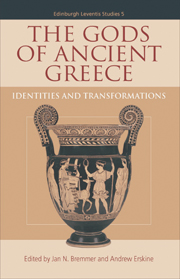Book contents
- Frontmatter
- Contents
- Preface
- List of Illustrations
- Notes on Contributors
- List of Abbreviations
- Introduction: The Greek Gods in the Twentieth Century
- 1 What is a Greek God?
- PART I SYSTEMATIC ASPECTS
- PART II INDIVIDUAL DIVINITIES AND HEROES
- PART III DIACHRONIC ASPECTS
- 14 Early Greek Theology: God as Nature and Natural Gods
- 15 Gods in Early Greek Historiography
- 16 Gods in Apulia
- 17 Lucian's Gods: Lucian's Understanding of the Divine
- 18 The Gods in the Greek Novel
- 19 Reading Pausanias: Cults of the Gods and Representation of the Divine
- 20 Kronos and the Titans as Powerful Ancestors: A Case Study of the Greek Gods in Later Magical Spells
- 21 Homo fictor deorum est: Envisioning the Divine in Late Antique Divinatory Spells
- 22 The Gods in Later Orphism
- 23 Christian Apologists and Greek Gods
- 24 The Materiality of God's Image: Olympian Zeus and Ancient Christology
- PART IV HISTORIOGRAPHY
- Epilogue
- Index
22 - The Gods in Later Orphism
from PART III - DIACHRONIC ASPECTS
Published online by Cambridge University Press: 05 August 2013
- Frontmatter
- Contents
- Preface
- List of Illustrations
- Notes on Contributors
- List of Abbreviations
- Introduction: The Greek Gods in the Twentieth Century
- 1 What is a Greek God?
- PART I SYSTEMATIC ASPECTS
- PART II INDIVIDUAL DIVINITIES AND HEROES
- PART III DIACHRONIC ASPECTS
- 14 Early Greek Theology: God as Nature and Natural Gods
- 15 Gods in Early Greek Historiography
- 16 Gods in Apulia
- 17 Lucian's Gods: Lucian's Understanding of the Divine
- 18 The Gods in the Greek Novel
- 19 Reading Pausanias: Cults of the Gods and Representation of the Divine
- 20 Kronos and the Titans as Powerful Ancestors: A Case Study of the Greek Gods in Later Magical Spells
- 21 Homo fictor deorum est: Envisioning the Divine in Late Antique Divinatory Spells
- 22 The Gods in Later Orphism
- 23 Christian Apologists and Greek Gods
- 24 The Materiality of God's Image: Olympian Zeus and Ancient Christology
- PART IV HISTORIOGRAPHY
- Epilogue
- Index
Summary
INTRODUCING ORPHISM
The title of this chapter includes two concepts which require explanation, since they are not self-evident: ‘later’ and ‘Orphism’. On the one hand, we must start from the assumption that what we call Orphism is not a doctrinal system, unique, dogmatic and always coherent. Various authors decided to ascribe their own poems to Orpheus, a mythical character, in order to give them the prestige of a great name and the status of revealed texts, which would consequently be true. Since they are authors from different times and even with different ideas, we may suppose that the doctrine found in different passages of the Orphic corpus will not be one and the same. Yet this tendency to variety and ideological dispersion is counterweighed by the fact that the name of the mythical poet was associated with specific themes (eschatology, the origin and destiny of the soul, salvation). Therefore, it was not possible to attribute to Orpheus any doctrine whatsoever, and even less to attribute any doctrines which contradicted those contained in other poems of the corpus. That is the reason why, in spite of the variety of answers to some questions which is found in poems of different times, we will also find some ideas in the poetry ascribed to Orpheus which remain practically unaltered across the centuries.
- Type
- Chapter
- Information
- The Gods of Ancient GreeceIdentities and Transformations, pp. 422 - 441Publisher: Edinburgh University PressPrint publication year: 2010



